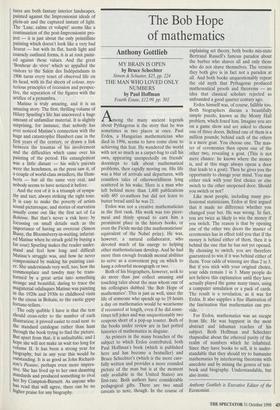The Bob Hope of mathematics
Anthony Gottlieb
Anong the many ancient legends about Pythagoras is the story that he was sometimes in two places at once. Paul Erdos, a Hungarian mathematician who died in 1996, seems to have come close to achieving this feat. He wandered the world with not so much as a carpet-bag to call his own, appearing unexpectedly on friends' doorsteps to talk about mathematical problems, then rapidly moving on. His life was a blur of arrivals and departures, with countless tales of otherworldliness lying scattered in his wake. Here is a man who left behind more than 1,400 publications with 485 co-authors but did not learn to butter bread until he was 21.
Erdos was not a creative mathematician in the first rank. His work was too piece- meal and thinly spread to earn him a prominent place in the history books, or even the Fields medal (the mathematicians' equivalent of the Nobel prize). He was, however, a natural collaborator, who devoted much of his energy to helping other mathematicians develop. And he had more than enough freakish mental abilities to serve as a convenient peg on which to hang a colourful monograph or two.
Both of his biographers, however, seek to do more than just collect amusing and touching tales about the man whom one of his colleagues dubbed 'the Bob Hope of mathematics'. This is just as well, since the life of someone who spends up to 19 hours a day on mathematics would be wearisome if recounted at length, even if he did some- times tell jokes and was unquestionably two coupons short of a pop-up toaster. Both of the books under review are in fact potted histories of mathematics in disguise.
As primers in the many branches of the subject to which Erdos contributed, both Paul Hoffman's book (which is published here and has become a bestseller) and Bruce Schechter's (which is the more care- fully written and provides a more rounded picture of the man but is at the moment only available in the United States) are first-rate. Both authors have considerable pedagogical gifts. There are two small caveats to note, though. In the course of explaining set theory, both books mis-state Bertrand Russell's famous paradox about the barber who shaves all and only those who do not shave themselves. The version they both give is in fact not a paradox at all. And both books unquestionably repeat the old myth that Pythagoras produced mathematical proofs and theorems — an idea that classical scholars rejected as unfounded a good quarter century ago.
Erdos himself was, of course, fallible too. Both biographers discuss a beautifully simple puzzle, known as the Monty Hall problem, which foxed him. Imagine you are on a game show and are asked to choose one of three doors. Behind one of them is a million pounds; behind each of the others is a mere goat. You choose one. The mas- ter of ceremonies then opens one of the other two, revealing a goat. (This is not mere chance: he knows where the money is, and at this stage always opens a door that leads to a goat). Then he gives you the opportunity to change your mind. You may either stick with your first choice or else switch to the other unopened door. Should you switch or not?
Like most people, including many pro- fessional statisticians, Erdos at first argued that it made no difference whether you changed your bet. He was wrong. In fact, you are twice as likely to win the money if you switch. The reason is that by opening one of the other two doors the master of ceremonies has in effect told you that if the money is behind either of them, then it is behind the one that he has not yet opened. By choosing to switch, you are therefore guaranteed to win if it was behind either of them. Your odds of winning are thus 2 in 3. But if you stick with your original choice, your odds remain 1 in 3. Many people do not believe this explanation until they have actually played the game many times, using a computer simulation or a pack of cards. The result is a revelation, as it was for Erdos. It also supplies a fine illustration of the fascination that mathematics can pro- vide.
For Erdos, mathematics was an escape from life. He was happiest in the most abstract and inhuman reaches of his subject. Both Hoffman and Schechter rhapsodise about the ethereal purity of the realm of numbers which he inhabited. Since they have books to sell, it is under- standable that they should try to humanise mathematics by interleaving theorems with anecdote and by mixing the genres of text- book and biography. Understandable, but also ironic.
Anthony Gottlieb is Executive Editor of the Economist.


















































































 Previous page
Previous page